Best Practices Articles

Mastering Channel Marketing: In-Depth Insights and Proven Strategies
In the ever-evolving landscape of business and technology, channel marketing emerges as a cornerstone for businesses aiming to amplify their market presence and boost sales. Companies can strategically position their products or services to a broader audience by collaborating with intermediaries. This comprehensive guide will shed light on channel marketing's various facets, its inherent advantages, and how to maximize its potential. Drawing from the expertise of ZINFI professionals and their understanding of the transformative power of artificial intelligence in channel-based sales, we'll present the best practices that can set your channel marketing endeavors on the path to success.
What is channel marketing?
Channel marketing is a nuanced strategy where businesses collaborate with third-party intermediaries to promote and distribute their offerings. Instead of a direct-to-consumer approach, companies employ channels like distributors, resellers, and agents to penetrate their target markets. This method allows businesses to leverage these partners' extensive networks and expertise, ensuring a more expansive market presence and a more streamlined distribution process.
The essence of channel marketing lies in its ability to tap into established networks, reducing the time and resources a company might otherwise expend to reach a larger audience. With the rise of AI, businesses can now harness data-driven insights to optimize their channel marketing strategies, ensuring they remain relevant and effective in the 21st century.
What are the benefits of channel marketing?
Channel marketing has advantages that can transform a business's outreach strategy. First, it provides an avenue to access previously untapped markets and customer segments. Companies can achieve rapid market penetration by utilizing the strengths and networks of channel partners. This collaboration often leads to reduced operational costs as partners take on the responsibilities of storage, distribution, and sometimes even marketing. Furthermore, these intermediaries often have deep-rooted relationships with the target audience, enhancing brand credibility and increasing sales.
The synergy between businesses and their channel partners can result in a win-win situation, with both entities benefiting from increased revenues and market share. In the evolving landscape of business partnerships, mastering partner management becomes crucial. As ZINFI has suggested elsewhere, the future of partner management in an AI-driven economy will be focused on advanced automation, which will revolutionize roles and make channel marketing even more efficient.
What are the different types of channel marketing?
Channel marketing is diverse, encompassing various strategies like direct selling and retail, and the use of wholesalers, agents, and digital channels. Direct selling is a hands-on approach where products are sold directly to consumers, eliminating intermediaries. Retail channels are physical storefronts where consumers can purchase products. Wholesalers operate by buying products in large quantities and selling them to retailers. Agents represent the company, promoting and selling its products on its behalf. Lastly, digital channels – which have gained special prominence in recent years – include online platforms, e-commerce sites, and affiliate marketing networks.
Each channel has unique advantages and is chosen based on the product, target audience, and business objectives. With the empowerment of the partner ecosystem through-channel marketing automation, businesses can navigate the complexities of the current business environment more effectively.
How do you develop a channel marketing strategy?
Crafting a robust channel marketing strategy demands a deep understanding of your target audience, market dynamics, and the strengths and weaknesses of potential channel partners. Begin by meticulously identifying and segmenting your target market based on demographics, behavior, and needs. Evaluate the many channel options available and ascertain which ones resonate with your overarching business goals. Once partners are chosen, fostering collaboration, setting clear expectations, and equipping them with the requisite resources and support is imperative.
Periodic reviews and strategy tweaks based on performance metrics and market feedback are essential to ensure continued success. The evolution of partner portal software, as highlighted by ZINFI’s Unified Partner Management platform, emphasizes the importance of embracing hyper-personalization, deep DIY admin, and minimum viable portals in today's channel marketing strategies.

How do you choose the right channel partners?
The selection of channel partners can make or break your channel marketing endeavors. Seek partners who align with your business ethos, boast a formidable market presence, and have the insight to champion your products effectively. Rigorous due diligence is paramount—assess their historical performance, financial stability, and market reputation. Transparent communication is the bedrock of a fruitful partnership, ensuring that both parties have congruent goals and expectations.
In the dynamic world of digital marketing, affiliate marketing has emerged as a potent tool. Harnessing the power of affiliate marketing automation can amplify your brand and reduce marketing costs, making it a valuable strategy for choosing and collaborating with the right partners.
How do you manage channel relationships?
Effective management of channel relationships hinges on consistent communication, unwavering support, and swift resolution of concerns. Regular training sessions, provision of marketing materials, and incentives can galvanize and empower your partners. Clearly defined performance metrics and periodic reviews ensure accountability and alignment with set objectives. Trust and transparency are invaluable, fostering an environment where feedback is welcomed and acted upon. As ZINFI points out, partner enablement is crucial in driving productivity and growth in today's economy. By focusing on partner enablement, businesses can ensure their channel partners are equipped with the tools, resources, and knowledge needed to succeed.
How do we measure the success of channel marketing campaigns?
Evaluating the success of channel marketing requires a multifaceted approach. Key metrics include sales volume, market share, customer satisfaction, and partner engagement. These metrics should be tracked assiduously and juxtaposed against predetermined benchmarks. Feedback loops with partners and customers can offer invaluable insights, highlighting areas for improvement and strategy re-calibration. In a hyper-competitive business world, automating partner-driven co-selling can accelerate revenue at a lower cost, providing a tangible measure of the success of channel marketing campaigns.
What are the latest trends in channel marketing?
Channel marketing is in flux, with digital transformation at its helm. The proliferation of e-commerce, affiliate marketing, and influencer collaborations are some of the most important emerging trends. Additionally, the infusion of data analytics, personalized marketing strategies, and the integration of AI and machine learning tools are revolutionizing channel marketing, making it more efficient and targeted.
Co-marketing, as ZINFI suggests, unlocks cost-saving benefits and drives business growth. By leveraging the power of co-marketing, businesses can collaborate with partners to amplify their reach and reduce marketing expenses.
How can technology improve channel marketing?
Technology is a linchpin in bolstering channel marketing efforts in today's digital age. CRM systems, analytics tools, and digital platforms can be harnessed to refine operations, glean actionable insights, and fine-tune strategies. Automation tools are invaluable for audience segmentation, campaign personalization, and real-time performance assessment. As highlighted by ZINFI, partner recruitment and onboarding are areas where technology can significantly reduce costs and accelerate time to market. By leveraging appropriate technology, businesses can streamline these processes, ensuring they bring the right partners on board efficiently and effectively.
What are the best practices for channel marketing?
Drawing from ZINFI's expertise, creating a mobile-responsive partner portal is recommended, ensuring easy navigation for partners. This portal should be replete with tailored content, campaigns, and programs. Businesses can dynamically manage and disseminate content to partners by employing Unified Partner Management tools that help them promote and track partner program utilization.
In the evolving landscape of business partnerships, mastering partner management becomes crucial. As ZINFI suggests, the future of partner management in an AI-driven economy will see automation revolutionizing roles, making channel marketing even more efficient.

Download Best Practices Guidebook.
Closing
With its multifaceted strategies and benefits, channel marketing is an indispensable arsenal for businesses aiming for expansive growth. Companies can set themselves on a trajectory of sustained success by imbibing its principles, understanding its nuances, and implementing best practices, especially those championed by industry stalwarts like ZINFI. As the channel marketing landscape continues to metamorphose, staying agile and informed will be the keys to thriving in this dynamic domain.
For more information, please check our video podcasts.
Best Practices Guidebook
 Modernizing Channel Marketing: AI and Ecosystem Enablement Best Practices
Modernizing Channel Marketing: AI and Ecosystem Enablement Best PracticesDownload for FREE
 The Channel’s Shift to Partner-Led With AI Best Practices
The Channel’s Shift to Partner-Led With AI Best PracticesDownload for FREE
 Hyperscalers, ISVs, and AI: Shaping the Future of B2B Software Distribution
Hyperscalers, ISVs, and AI: Shaping the Future of B2B Software DistributionDownload for FREE
 Definitive Guide to a Partner Ecosystem-First Sales Strategy
Definitive Guide to a Partner Ecosystem-First Sales StrategyDownload for FREE
 The Partner-Led Digital and AI Transformation Best Practices
The Partner-Led Digital and AI Transformation Best PracticesDownload for FREE
 Startup Talent Recruitment: Hiring Missionaries, Not Mercenaries
Startup Talent Recruitment: Hiring Missionaries, Not MercenariesDownload for FREE
 The Future of Partner Relationship Management with AI in Partnerships
The Future of Partner Relationship Management with AI in PartnershipsDownload for FREE
 Cybersecurity for the 99%: Strategies from the Frontline
Cybersecurity for the 99%: Strategies from the FrontlineDownload for FREE
 Mastering Partner Relationships: A Strategic Approach to Business Growth
Mastering Partner Relationships: A Strategic Approach to Business GrowthDownload for FREE
 Mastering Partner Relationship Management: Keys to SaaS Channel Success
Mastering Partner Relationship Management: Keys to SaaS Channel SuccessDownload for FREE
 Navigating the AI Revolution: Guide for Partners in the Microsoft Ecosystem
Navigating the AI Revolution: Guide for Partners in the Microsoft EcosystemDownload for FREE
 Mastering the Modern Buyers Journey: Sales Leader’s Guide to AI & Engagement
Mastering the Modern Buyers Journey: Sales Leader’s Guide to AI & EngagementDownload for FREE










